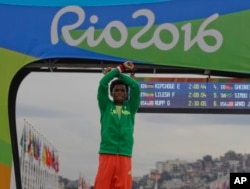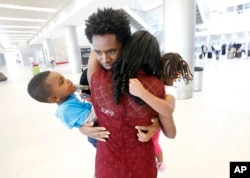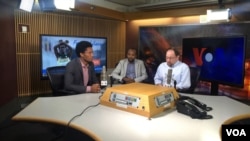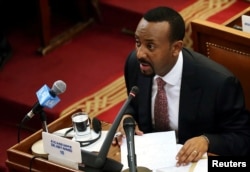After winning the silver medal in the men’s marathon at the 2016 Olympic Games in Rio de Janeiro, Brazil, Feyisa Lilesa spent two years in self-imposed exile in the United States. Now, he’s returning home.
Feyisa will return to Ethiopia in the coming weeks with his wife and children after two athletics groups notified him that he would receive a hero’s welcome upon arriving.
Ashebir Woldegiorgis, the president of the Ethiopian Olympic Committee, told VOA Amharic that the call for Feyisa to return is meant to better the country.
“He can teach his exemplary ways to other athletes and teach strength to our youngsters. That’s the main call, so he can come back to participate in the sport he loves and pass it on by running and by advising to elevate Ethiopia’s sport,” Ashebir said.
Show of protest
Feyisa made international headlines when he raised his crossed wrists above his head at the finish line, and again on the podium, at the 2016 summer games.
The gesture showed his support for people protesting in the Oromia region of Ethiopia, raised international awareness of human rights concerns in Ethiopia and made Feyisa a target.
At the time, the country was heading into a state of emergency, and violent protests were spreading across Oromia, its largest region. Ethnic Oromos were speaking out against marginalization and oppression, and the gesture Feyisa used in Rio became a symbol of solidarity with protesters, many of whom were young students.
Shortly after the games, Getachew Reda, then the information minister of Ethiopia, congratulated Feyisa and assured him it was safe to come home.
But the decorated athlete felt differently and, after the games in Rio, used a special-skill visa to come to the U.S., where he settled in Flagstaff, Arizona. He spent six months alone, before his wife, son and daughter joined him.
Taking a stand
After the Olympics, Feyisa made occasional statements to raise awareness of the situation in Ethiopia, and he continued training.
“There were times when things were happening, and I wrote things from my inner thoughts, not because I have skills, but people take my message and share it,” Feyisa told VOA’s Afaan Oromoo service, speaking in Amharic.
“But I am an athlete, and I am not that appealing. But when I write what I feel and people share, I am happy with it,” he added.
Haile Gebrselassie is a retired Ethiopian runner and twice won Olympic gold medals. He’s now with the Ethiopian Athletic Federation and told VOA that the decision to invite Feyisa back reflected his willingness to take a stand.
“He was born fearless. I knew him personally, and I was close to him. And he questions why people should be oppressed. He stands up for his people.”
Feyisa was willing to raise his voice at great personal cost, Ashebir added. “I like heroes. I respect people who stand up and speak up.”
Reconciliation
Feyisa isn’t the only Ethiopian to whom the country has been extending an olive branch.
Since a fresh state of emergency was lifted in June, Ethiopia’s prime minister, Abiy Ahmed, has reached out to the country’s many political and ethnic groups to create more space for constructive dialogue.
The government has removed several groups from its list of terrorist organizations, and, in a sign of continued thawing, a delegation of Oromo Liberation Front members visited the capital, Addis Ababa, Tuesday after agreeing to end hostilities with the government last week.
For his part, Feyisa said he doesn’t have ambitions beyond running. “My skill until now is athletics, and I want to work hard and return back to my previous capacity,” he said.
“I just want to share my gratitude. I would like to thank our citizens who sacrificed their lives … all of the young people and the elders who participated in the struggle,” Feyisa said.
Tigist Geme, with VOA’s Afaan Oromoo service, contributed reporting from Washington. Eskinder Firew, with VOA’s Amharic service, contributed reporting from Addis Ababa.








